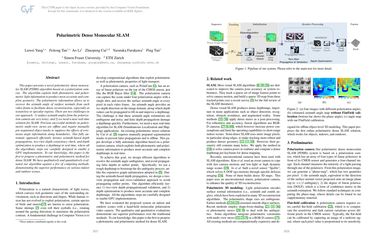Polarimetric Dense Monocular SLAM
This paper presents a novel polarimetric dense monocular SLAM (PDMS) algorithm based on a polarization camera. The algorithm exploits both photometric and polarimetric light information to produce more accurate and complete geometry. The polarimetric information allows us to recover the azimuth angle of surface normals from each video frame to facilitate dense reconstruction, especially at textureless or specular regions. There are two challenges in our approach: 1) surface azimuth angles from the polarization camera are very noisy; and 2) we need a near real-time solution for SLAM. Previous successful methods on polarimetric multi-view stereo are offline and require manually pre-segmented object masks to suppress the effects of erroneous angle information along boundaries. Our fully automatic approach efficiently iterates azimuth-based depth propagations, two-view depth consistency check, and depth optimization to produce a depthmap in real-time, where all the algorithmic steps are carefully designed to enable a GPU implementation. To our knowledge, this paper is the first to propose a photometric and polarimetric method for dense SLAM. We have qualitatively and quantitatively evaluated our algorithm against a few of competing methods, demonstrating the superior performance on various indoor and outdoor scenes.
PDF Abstract